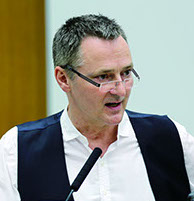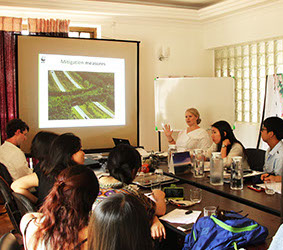-web-crop-u4138.jpg)
Students from the Architectural Conservation programme at Yangon Field Study.
(Courtesy of Ian Babbitt)

HELPING
MYANMAR BLOSSOM
Now in its second year, StudioMYANMAR is a major initiative by the Faculty of Architecture to promote cross-cultural understanding among architecture students and professionals and to give them a sense of global citizenry through helping a developing nation.

![]() We hope this will be a partnership that becomes important to the city as it develops and has some small impact on the Yangon enjoyed by many future generations.
We hope this will be a partnership that becomes important to the city as it develops and has some small impact on the Yangon enjoyed by many future generations. ![]()
Professor Chris Webster
The main aims of StudioMYANMAR, which was launched in late 2013 by Architecture Dean Professor Chris Webster, are to provide Architecture, Conservation, Planning and Landscape students with “challenging learning opportunities, to enhance HKU‘s role as leading university in the region… and to provide opportunities for students to engage in socially responsible projects in the developing country of Myanmar and learn the positive value of global citizenship.”
Said Professor Webster: “I would like, all of our undergraduates to have the opportunity to spend one semester in a fast-developing city like Shanghai, one of the most sophisticated globalised cities in the world, as well as having work experience in Yangon, which is at the other end of the development spectrum.”
In 2014, the Faculty ran four major projects in Myanmar – studios in Landscape Design, Architectural Conservation, Architecture and Sustainable Design and Architectural Infrastructure. It also conducted field trips and offered lectures to local professionals and students. Four major projects are planned for this year.
“We had a 10-day Architecture Studio in Yangon in November,” said Professor Webster. “Our students worked with local architects from the Yangon Heritage Trust on energy-efficient design projects that sought to adapt some of Yangon’s iconic early-19th-century colonial buildings.”
Projects included planning how to better conserve and enhance an old railway building –
a real project being undertaken by consultant architects in the city. The HKU students got to talk to stakeholders and investigate the site and were asked to produce their own designs based on the real brief. “They were mimicking the exercise being undertaken by qualified architects,” said Professor Webster. “If students produced something the client liked, there would be some chance of it being incorporated in the built project.”
The group also focussed on low energy, low carbon-emitting design techniques and they partnered with Hong Kong firm of architects LWK, which worked with them on surveying and visualisation, including 3D modelling. One exercise required a drone fly-past over the city, which enabled the students to donate aerial pictures to government agencies in Yangon – which they did not have before.
Projects this year include a Landscape Planning Studio entitled Design on the Road to Burma, led by Assistant Professors Mr Ashley Scott Kelly and Ms Dorothy Tang, during which 19 landscape architecture undergraduates travelled from Thailand to Myanmar to study regional planning of the Dawei-Kanchanaburi corridor and Special Economic Zone (SEZ). Prior to going, the group spent five weeks producing a 200-page research report, comprising maps, timelines and diagrams which contextualise the SEZ across industry, investment, land rights, ethnic conflicts and environmental conservation. While there, students presented their work to international organisations including the World Wide Fund for Nature (WWF), the Wildlife Conservation Society and the Dawei Development Association. Students will now speculate on designs for this internationally strategic development corridor.
The Faculty has made a multi-year commitment to working on the environmental design of Yangon, with a focus on the Central Business District and colonial quarter along the Yangon River. The area has been earmarked for development and is likely to rapidly become a high-density glitzy commercial and hotel district. But the students are imagining a different plan – one that is being supported by the Yangon Heritage Trust and that would conserve many more of the heritage buildings in this globally unique area and see an altogether greener and more culturally rich modern Yangon.

Construction underway in Yangon’s historic district brings opportunities and threats.
Ecologically sound
“Students took portions of city centre riverfront and developed landscape plans in anticipation of the area becoming a world-class heritage site within the next 10 years,” said Professor Webster. “The objective was to introduce issues of regional landscape planning in the context of a dynamic urban environment and to develop ecologically sound strategies. They returned to Hong Kong and produced a fantastic suite of designs.”
Representatives from Yangon Heritage Trust and from Yangon Technological University – one of the Faculty’s partners in StudioMYANMAR – came to HKU to give students feedback on those designs.
“This is a two-way programme,” said the Dean. “Our students learn a huge amount about Yangon, about architecture, planning and design in the real and constrained world of a country like Myanmar. They learn about themselves and about their counterpart students. We can offer freshness of view and ideas and perspectives from the wider world. We hope this will be a partnership that becomes important to the city as it develops and has some small impact on the Yangon enjoyed by many future generations. Right now the Faculty is waiting for a Memorandum of Understanding with Yangon Technological University to be signed by the Minister of Education in the country’s new capital. Once this is in place we can think about extending our StudioMYANMAR to other Departments and other Faculties.”


HKU students meeting with the World Wide Fund for Nature (WWF) Myanmar in Yangon.
HKU students presenting preliminary research to colleagues at Yangon Technological University.
Back

